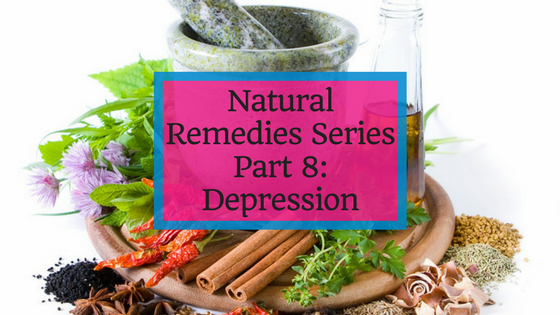Natural Remedies Series Part 8: Depression

350 Million people suffer from depression world wide according to the World Health Organization.
Chances are if you haven’t experienced depression, someone close to you has at some point in their life. There are many different types of depression Major Depression, Persistent Depressive Disorder, Bipolar Disorder, Seasonal Affective Disorder (SAD), Psychotic Depression, Peripartum (Postpartum) Depression, Premenstrual Dysphoric Disorder (PMDD), ‘Situational’ Depression, and Atypical Depression. No matter what name it goes by depression tends to be Taboo, and most people don’t want to talk about it or admit they’re dealing with it.
Depression can present itself in many ways. We could experience a sad mood, feeling helpless, lack of interest in regular activities, fatigue, low sex drive, or fatigue. There are many different things that can lead to depression too from nutrient deficiencies, stress, food allergies, toxicity to metals, emotional problems that are unresolved, imbalances in neurotransmitters, lack of sunlight, alcohol, or hormone imbalances. It can be difficult to pin point exactly what is going on and how to resolve it, which makes depression more difficult to combat.
I struggled with depression for over 18 years of my life and was medicated for most of them. I was told no matter what I did as I got older my depression would get worse and I would need more medication to control my symptoms. This fortunately was not true in my case. As luck would have it, I made changes that helped me kick depression and my medication to the curb. Thankfully so since the long term use of the medications had begun to take a toll on my body. I was experiencing side effects that had to go. Read more about my journey with depression here.
In this article I’m going to share with you some of the ways I beat depression and some other natural remedies that could help in the battle.
Get Moving – Increasing your heart rate for as little as 15-20 minutes a day can increase your serotonin levels and improve your mood throughout the day.
Develop a Routine – When we’re struggling with depression it seems like we can’t accomplish anything. If we set a routine, with goals to accomplish things, each time we complete an item on our to-do list it adds up. We begin to see that we can accomplish things.
Listen to Something Positive – Everyday get positive words into your mind. Either by listening to them or by reading them. Find something like a podcast, YouTube video, Bible, or motivational book. Each day start out feeding your mind with words of encouragement that will battle the negative thoughts that flood our minds when we wake up in the morning.
Find a Support System – Whether you surround yourself with an uplifting group of people or if you find a counselor, physician, life coach that you can talk to it’s important. Find people that will lift you up and not tear you down. We have enough negative words flying at us in social media, news and radio. We don’t need it in our inner circle.
Get Adjusted – Chiropractic care maximizes the health of the nervous system. It can help in making sure the body is properly aligned taking taking tension off the spine. Then there’s good communication between the brain and the body. The reduction in tension can help the body adapt better to daily activities.
Turn Down Coffee – While there are many benefits to coffee it doesn’t mix well when dealing with depression. It will boost your energy level, but that boost doesn’t last. Then it leaves you more irritable and exhausted.
Meditate – Regular meditation can help regulate mood. It has been shown to be uplifting and help in many other areas.
Foods to Increase:
Seeds – Pumpkin, Flax, Chia and Hemp Seeds all are an excellent source of Omega-3 Fatty Acids which help with brain function.
Wild Caught Fish – Like wild salmon, sardines, herring, mackerel, and anchovies. Again these fish are high in Omega-3 Fatty Acids helping with healthy brain function.
Saturated Fats – Found in coconut oil, grass-fed meats and raw dairy. These saturated fat rich foods help support neurological health and cellular function.
B Vitamin Foods – Like liver, clams, oysters, mackerel, salmon, herring, snapper, crab, spinach, beets, bell peppers, broccoli and asparagus. Vitamin B play a big part in helping the brain make the feel good hormones serotonin, dopamine, and epinephrine.
Foods to Decrease:
Hydrogenated Fat – These increase inflammation and trigger hormone imbalances.
Sugar – Causes energy boosts but then are followed by drops that lead to mood changes.
Alcohol – It’s a depressant that when dealing with depression shouldn’t be used.
Essential Oils:
There have been a few essential oils that have shown to help with some depression. They are bergamot, ylang ylang, roman chamomile, and lavender.
Disclaimer:
Please check with your physician before implementing any changes into your current routine.




One Response to Natural Remedies Series Part 8: Depression